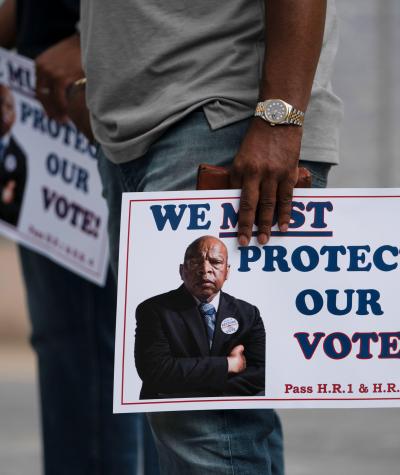The U.S. House of Representatives passed the John Lewis Voting Rights Advancement Act, otherwise known as H.R. 4 or the VRAA, on Aug. 24, 2021, taking a critical step to prevent states from passing voting laws that discriminate against racial minorities.
Now the Senate should follow the House’s lead and pass this bill to protect Americans’ freedom to vote.
The Voting Rights Act (VRA) has a long track record of earning overwhelming bipartisan support, as protecting voting access was a goal that transcended the political divide.
The VRA of 1965 was renewed by Congress five times after hours of hearings proving the persistence of racial discrimination in voting laws and the law’s unequivocal success in stopping it.
Signed into law on July 27, 2006 by former President George W. Bush, the most recent renewal of the VRA followed many hours of hearings that demonstrated the persistence of racially targeted policies in our democracy and the continued effectiveness of this law in combatting them. It passed the Senate that year 98-0.
However, if the end of the twentieth century was a period of voting rights expansion, the twenty first century has been a period of rising attacks on voting rights.
After the U.S. Supreme Court’s decision in the 2013 case Shelby County v. Holder, attacks on voting rights have reached a new fever pitch, and the U.S. Department of Justice (DOJ) does not currently have the tools it needs to hold states with a history of discrimination in voting accountable for passing discriminatory voting laws.
In the past decade, Americans have seen cutbacks to early voting periods, new burdensome requirements to cast ballots and restrictions on the right of civic groups to assist citizens in participating fully in the democratic process.
In a hearing before the House Committee on the Judiciary on Aug. 16, 2021, witness testimony demonstrated the urgency of congressional action addressing challenges faced by communities of color with access to voting.
According to a recent report released by Campaign Legal Center (CLC), at least four states that passed restrictive laws in the first half of this year would have been subject to preclearance if the John Lewis Voting Rights Advancement Act were in place.
This would have required them to prove to the DOJ or a federal court that their laws did not discriminate against voters of color.
Under the new formula provided by the VRAA, Alabama, California, Florida, Georgia, Louisiana, Mississippi, New York, North Carolina, South Carolina, Texas and Virginia would likely be subject to preclearance.
By passing H.R. 4, Congress would strengthen the guardrails of democracy and stop attacks on Americans’ freedom to vote in their tracks, allowing all voters to have a say in the future direction of our country.
